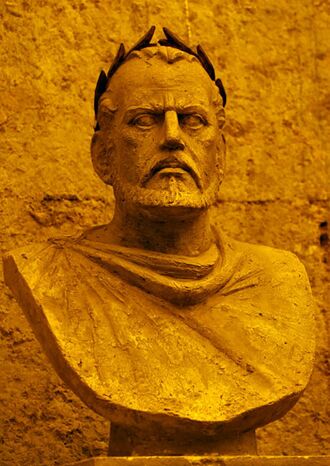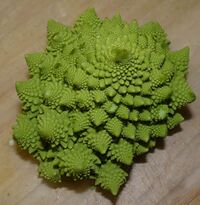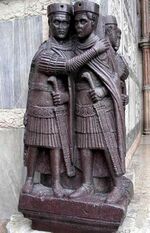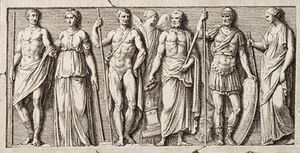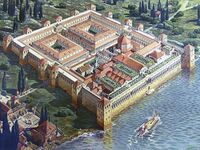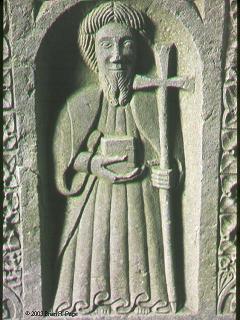Diocletian
“The Catherine wheels go round and round.”
“Cabbages are the only vegetables that don't answer back.”
“You've lost your Roman marbles.”
If any Roman Emperor came close to destroying Christianity then Diocletian (full name Diocletian Alanus Amstradivarius Masculinus-Boobus) would rank right up there with Karl Marx, Stalin and Darwin. A genius organiser, motivator, currency fixer and winner of Grocer of the Year for two decades in the late 3rd century, Diocletian wanted to reorganise the Roman Empire so that it only served one purpose: Namely, himself.
Diocletian tore down the fiction that the empire as designed by Augustus was a socialism of the people, a 'we're all in this civilization together' approach. First amongst equals? Really?? A meritocracy??? hahaha..a theme park for weekend centurions???? No. It would be in future about domination with a capital D. With the chaos that had gone before, Diocletian was offering Order, Discipline and Paperwork. It was to him a great vision but it wasn't one the Christians were eager to subscribe too. So Diocletian made it his life work to scrub them out out Rome's future. He failed but Diocletian got his retirement plan fixed in advance, building a retreat the size of a small city along the shore of the Adriatic. It's still there. Now that is efficiency for you
Origins[edit]
Diocletian originally came from the Balkans, a dusty one dog town called Bonofido in the province of Illyricum in around 244. He grew up in an era when people changed their clothes slower compared to the rapid turn over of Roman emperors. From the death of emperor Severus Alexander in 235 to 284 — a period of 50 years — no fewer than 66 men had tried on the purple pants and matching hat. All had died violently, either by assassination, murder, death in battle — or in case of emperor Valerian — ending up as a stuffed exibit in the court of a Shah of Persia. Add to this an invasion by German tribes, the first appearance of the Goths and regular rebellions, the Roman Empire was in a chaotic state. Diocletian — or Dio Dipstickus as he was then — tried to stay out and learnt a trade as a gardener. But no one wanted to pay, money being in short supply as those responsible for Rome's money supply had to keep recalling the coinage to overstamp the denarii to remove the memory of a fallen emperor.
For a man who adored carrots but especially cabbages, this disorder made no sense. Diocletian just hated people messing him around and so took the only path open for the son of a slave: He joined the Roman army. Which one isn't known but he seems to have developed a skill in avoiding being on the losing side. Using his Balkans connections, Diocletian became a trusted soldier. Dependable but put down as a bit odd with his horticultural obsessions. When Emperor Carus in 283 decided to go to war against the Persians for cheap military glory, Diocletian insisted in going to provide the emperor with a daily bowl of his vegetable soup (Cream of Imperium). Carus stayed healthy during the campaign but did insist marching around in a full suit of armour in a rain storm. When he got fried by a thunderbolt, the Roman soldiers feared Jupiter was intending to give them a hard time.
Since Carus had brought his youngest son Numerian with him, the legions proclaimed him as emperor. In the West, Carus's older son Carinus had been left in charge. Once he knew his father had died, he proclaimed himself emperor too. Diocletian once again offered his cooking skills on behalf of the new emperor but Numerian preferred a different cook. Falling out of favour — and flavour — was a dangerous sign but Numerian was an oddball anyway. For a Roman, he stank a bit, but this was put down to grief for his father. Numerian retreated to his horse-drawn caravan but his body odour didn't improve until he noticed a steady stream of flies buzzing in and out. Diocletian stuffed a hankie over his nose and opened the caravan's door. Numerian's dead body was covered in maggots. That seemed to be pretty conclusive.
It's all yours[edit]
Numerian's death was blamed on his personal chef Aspergus. Diocletian said he saw the cook coating the asparagus in poisoned seasoning. Aspergus's was allowed to die very slowly, toasted brutally over a low fire to extend the agony. It made macabre entertainment for the legion as they tucked into one of Diocletian's dishes. Once finished, they made him emperor.
Ruler in the East, Diocletian now had to tackle Carinus for the overall imperial title. Though he had been loyal to Carinus's father Carus, Diocletian had a dim view of anyone 'inheriting' the job of emperor. Then he received news that Carinus had taken his imperial powers a bit too far, demanding the right to sleep with his officer's wives. Perhaps seeing him as another would-be Caligula, Carinus was murdered in mid-shag and his head dropped on Diocletian's door mat. The Roman empire was back as one.
Diocletian was no fool. Any whiff of failure or timidity would see him and his control swiftly terminated. Memories were always short and the Mobile Vulgus (the cheap non-smart phone losers) would always blame him if they couldn't get a decent signal. No the problem was Rome's constitution had essentially boiled down to 'My Legions are Bigger Than Yours'. There had to be a better way.
I am a man with a plan[edit]
Like all newly proclaimed emperors, Diocletian enjoyed a imperial honeymoon. The days when senators had looked down on soldier emperors was in the long ago past, in fact if you weren't a dab hand at the short stabbing sword or a wow with a spear then your life expectancy as emperor could be numbered in days. Then there had been emperors who only became rulers because their dad's influence. More often than not junior had been a disappointment. So Diocletian had an idea, the next emperor would start out as an apprentice and work his way up.
First of all, the important decision was to turn the Roman Empire into a joint stock holding company. There would be two bosses but they would operate in different offices. Diocletian made his capital in a city called Nicomedia, across the shore from the then country bumpkin city of Byzantium. In the West, in the city of Mediocre (later renamed as Milan) would be the acting capital of the Roman world in the west. Rome itself was turned into a 24 hour pleasure-seeking city that could be equally visited by either emperor.
Diocletian selected his bull-necked soldier friend Maximian Heightus as his Official Best Friend, Augustus Fides. Acting as their deputies with the title of Caesar were to be Constantius Chlorinus (he liked a good scrub) and Galerius Glucose (for his sugary talk). They were positioned on the frontiers and were expected to do the sharp business. Diocletian called this system of government The Tetrarchy — though it later became known as The Treachery when all ideas of a smooth progression from a Caesar to Augustus would be undone by literal back stabbings, a well tried and trusted Roman method of political change.
Purple reign[edit]
Having sorted out the imperial pecking order, Diocletian next decided to reform the Roman Currency. Of late thanks to inflation and coin clipping, money had been replaced by buttons and toothpicks in some of the poorer provinces. Diocletian had all these replaced by a gold coin known as a 'solidus'. Since 99% of the population couldn't afford owning one of these, Diocletian also instructed mean little copper tokens to be minted, these were called the Euro-Denarii. They were to be thrown to the crowd on imperial visits.
The next of Diocletian's ideas was to introduce some distinctly pervy ideas of governance that went under the name of 'The Dominate'. Diocletian and his fellow Tetrarchs were the masters, everyone else was a slave and would have to crawl on all fours when introduced to the emperor at his court. If they wore leather and a mask, their grovel index would be increased and a job in the imperial Roman bureaucracy guaranteed. Some of the more ancient Romans called these methods of rule as 'Egyptian', recalling the times of Cleopatra when she would walk her palace in Alexandria with Mark Antony following behind on a gold chain tied around his scrotum.
Diocletian defended his new Roman constitution on the grounds that in these dark times with barbarians and other enemies just itching to slice open some fat Roman bellies, that the traditions of liberty and the law could be put aside in an emergency. Diocletian and Maximian didn't have to worry about the Roman senate. The political class there had long ago surrendered any powers they had once and had turned it into an exclusive dining club. Roman Express? Yes, that would do nicely.
Bureaucracy and a rebellion[edit]
With now four imperial courts to service with papyrus and paper clips, Diocletian quadrupled the number of bureacrats to run the Roman government. Every day pages and pages of edicts were sent from major issues like banning everyone under the rank of caesar to wear anything purple to how many eggs should be used to make an omlette. Anyone flouting this would be reassigned to compulsory service on the galleys or a posting on a remote frontier outpost. Diocletian even tried to fix the price of pasta and forbade the importation of tea from India and China.
In Britannia this 'meddling' from Diocletian and Maximian led to a revolt. It was led by the the smooth 'true blue' Romano-Elite naval commander Carausias. Cheekily he stole the Roman Fleet based in Boulogne and sailed it back across the Channel. Carausias then proclaimed himself Etonius Eternalus Imperator (or 'Trifle' for the colour of his flushed face). He also refused to use the new solidus and instead introduced a currency made from compressed empty beer cans. Arrogantly confident and confidently arrogant, Carausias also broke with the Roman religion and to help build support declared Boadicea a national hero. Her cult statue was set up in Londinium in the Meryl Streepium and a national anthem (I) Rule In Britannia would be played every night.
Diocletian urged Constantius Chlorinus (the nearest deputy emperor to Britannia to put down the revolt. However truculent Gauls and their 'out woaded' work practises made it very slow to build enough invasion barges quickly. Then news came that Carausias had been killed by his deputy Nicomeddler Allectus, suffocated to death by having his head stuffed in a handbag. Allectus tried to molify the situation by suggesting he was 'willing to work with the Romans' and introduce the solidus. But to the Tetrarchs, Allectus was a rebel and he got his answer with a spearing on a battlefield just outside Londinium.
Sacrifice to me or die[edit]
The recapture of Britannia and some very favourable results along the frontiers with various barbarians made Diocletian very popular. The Roman Empire now seemed to be on a proper business footing, no more nonsense about sons inheriting the imperial title just because who there father was. But perhaps Diocletian didn't believe his own imperial rhetoric because he encouraged his three colleagues that they should be linked by marriage. So Diocletian's daughter Valeria married Galerius (Caesar of the East) whilst Maximian's step daughter Theodora married 'the pale ale' rider Constantius Chlorinus (Caesar of the West). To make sure no one misbehaved, Maxentius (Maximian's son) and Constantine (Constantius's son) be sent to Diocletian's palace at Nicomedia as hostages.
It was whilst relaxing in the new 'glory' of a restored empire, Diocletian wanted to know why the past 70 years had been basically shit. A Roman Senatorial Committee was set up and came back the next day with an answer:Christians. The spread of Christianity it was alleged had sapped the Roman military spirit and turned the empire of Augustus and Trajan into 'an imperium of muesli'. Diocletian issued an Edict to be circulated all round the empire. Christians were to be surpressed, re-paganised, expelled or killed. Women would not be exempt. The edict read like this:-
| “ | ...that Christians refuse to acknowledge the Roman standard and do not sing the imperial anthem 'I Want the Power'...that they partake in ritual and actual cannibalism under the title 'eucharist' and don't eat enough vegetables. In the name of Emperors Diocletian and Maximian, Caesars Galerius and Constantius, an edict is here issued. Anyone found eating wafers or saying prayers to the criminally convicted Jesus 'Woody' Christus...suffer losses and hurt...no food vouchers...or allowed to play lotto...denial of the Sacred Cabbage...etc...etc...etc.. | ” |
Though this wasn't their first persecution — Nero got the first T-shirt there — Diocletian's edict was thorough. Churches, bibles, priests and bishops were destroyed or burnt. Some became martyrs. St.Catherine threw herself onto a burning wheel, St.George wrestled a dragon in his rubber underwear (it was a kinky dragon) and St.Vitus was condemned to dance himself to death. St.Sebastian's death was different, he allowed himself to become an arrow target practise for his fellow soldiers. This is now considered to be euphemism for homosexual rape. When Christianity was re-legalised and then allowed to persecute others, Sebastian's story was suitably re-edited but the business with the archery was distinctly strange if read literally.
Golden handshake[edit]
By 305 Diocletian decided he had enough of ruling. He got a golden chariot once he passed 20 years in office but now he dreamed of running his own personal garden centre. He was going to retire and told Maximian to do likewise, even though he knew his old friend had no hobbies and didn't want to leave his palace. But Diocletian insisted. The new emperors Constantius I and Galerius then selected their own Caesars (Severus II and Maximinus Daia) but no one was willing to give Maxentius or Constantine anything.
Diocletian didn't care. He had gotten a retirement palace built by the shore of the Adriatic Sea. It was called the Postmortem and had a lavish interior. Diocletian also had his tomb constructed there but had a huge wall built round it to keep out the curious and peeping Toms. Inside, Diocletian returned to his love of cabbages and rude vegetables. Outside, all was turmoil, as Maximian tired of his care home and came out to help his son Maxentius against his rivals. He visited Diocletian, urging him to put away his fly spray and threw stones at the ex-emperor's greenhouse. But Diocletian urged his friend to 'eat more greens' and 'stay off the red stuff'. It was to no effect.
It should have been a happier retirement. Diocletian's daughter Valeria found herself a widow on the death of Galerius and asked to move back home with her dad. But Diocletian refused, he had turned all the guest bedrooms into vegetable patches. She was later killed for refusing to marry Emperor Licinius.
According to the Catholic Church, Diocletian died in extreme agony, seeing visions of his victims come into his palace and tread all over the tomato plants. Whether this is true or not, the old emperor was dead by 312. He missed out seeing Constantine beat Maxentius and then reverse all the edicts he once issued.
Christians' revenge[edit]
Diocletian's Tetrarchy system had been a failure, an attempt to train-up future emperors on the job was abandoned by Constantine as too complicated. Constantine didn't reverse Diocletian's other changes, though emperors were no longer semi-divine with the establishment of Christianity as the state religion.
The pagans now found themselves under attack and it was their turn to suffer destruction. Diocletian's palace at Split was abandoned to the cabbages and stray cats, his tomb no doubt plundered and his earthly remains destroyed by vengeful Christians. A century later and with the countryside full of barbarians, the old palace was reoccupied and turned into a town. To signify their triumph, the Catholics turned Diocletian's mausoleum into a church, priest taking turns to remind their congregation that it's previous occupant was burning in hell.
See also[edit]
| Preceded by: Numerian and Carinus |
Roman Emperor 284-305 |
Succeeded by: Maximian, Maxentius, Galerius and Constantius I , |
| ||||||||||||||||||||||||||
